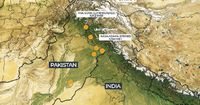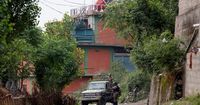In a significant military operation dubbed "Operation Sindoor," India has struck at nine sites identified as terrorist infrastructure in Pakistan and Pakistan-occupied Kashmir (PoK), following a brutal attack on Indian tourists in Pahalgam that left 26 dead. The operation, which took place in the early hours of May 7, 2025, marks a pivotal moment in the ongoing conflict between the two nuclear-armed neighbors.
Indian officials confirmed that the strikes, executed between 1:05 am and 1:30 am, specifically targeted the headquarters of the militant groups Lashkar-e-Taiba (LeT) and Jaish-e-Mohammad (JeM). Colonel Sophiya Qureshi stated, "Operation Sindoor was launched by Indian armed forces to deliver justice to the victims of the Pahalgam terror attack and their families, destroying nine terrorist camps." The operation was characterized by precision and the use of advanced technology to minimize collateral damage, with Wing Commander Vyomika Singh noting that the action was undertaken with "careful selection of warheads" to ensure that there was "no collateral damage."
The backdrop of this military action is the horrific attack on April 22, 2025, when terrorists associated with the LeT opened fire on a group of tourists in Pahalgam, Jammu and Kashmir. This attack, which killed 25 Indians and one Nepali citizen, has been described as one of the deadliest assaults on civilians in recent history, evoking memories of the 2008 Mumbai attacks. Foreign Secretary Vikram Misri emphasized the brutality of the Pahalgam attack, stating that victims were executed in front of their families, a tactic aimed at instilling terror and provoking communal discord.
According to Misri, investigations into the attack revealed communication notes indicating the involvement of terrorists in Pakistan. He criticized Pakistan for its lack of action against the terrorist infrastructure, stating, "Despite a fortnight having passed since the attacks, there has been no demonstrable step from Pakistan to take action against the terrorist infrastructure on its territory or on territory under its control." He further asserted that India had intelligence suggesting further attacks were being planned, necessitating a preemptive response.
Operation Sindoor was framed as a measured and proportionate response, with Indian officials stressing that no military establishments were targeted, and the strikes were aimed solely at dismantling terrorist capabilities. The Defense Ministry characterized the operation as a legitimate exercise of India's right to self-defense, stating that it focused on disabling terrorists likely to be sent across the border into India.
However, the strikes have drawn sharp criticism from Pakistan, which labeled the attacks a "blatant act of war." Pakistani military officials reported that their forces had shot down five Indian aircraft during the conflict, a claim that remains unverified by India. The Pakistani military also reported civilian casualties, claiming that at least eight people were killed and more than 35 were injured in the strikes. Among the dead was a three-year-old girl, highlighting the tragic toll of the military action.
In the wake of the strikes, air travel has been severely disrupted across northern India. The Airports Authority of India announced the closure of the Srinagar airfield, affecting commercial flights. Airlines such as IndiGo and SpiceJet have suspended operations in several cities, including Jammu and Amritsar, while international carriers like Qatar Airways have temporarily halted flights to Pakistan due to the closure of airspace.
In a broader context, the military action has escalated tensions between India and Pakistan, which have a long history of conflict over the Kashmir region. The Line of Control (LoC), which divides the two territories, has seen increased military activity from both sides in recent weeks, with reports of reciprocal shelling and military engagements.
The international community has closely monitored the situation, with various media outlets highlighting the potential for further escalation. The New York Times reported that India had informed the United States in advance of the strikes, suggesting a strategic effort to mitigate international backlash. CNN described the operation as a major escalation in the India-Pakistan conflict, emphasizing India's use of advanced weaponry such as Rafale fighter jets and SCALP cruise missiles.
As the situation develops, the focus remains on the humanitarian impact of the conflict and the implications for regional stability. The Indian government has reiterated its commitment to holding the perpetrators of the Pahalgam attack accountable, framing the military operation as part of a broader strategy to combat cross-border terrorism.
In a press briefing, Foreign Secretary Misri remarked, "We are living up to the commitment that those responsible for this attack will be held accountable." He underscored the importance of dismantling the terrorist infrastructure that has plagued India for decades, asserting that the latest military actions should be viewed in the context of ongoing efforts to ensure national security.
As tensions remain high, both nations are bracing for potential retaliatory measures, with Pakistan vowing to respond at a time and place of its choosing. The international community watches closely, aware that any miscalculation could lead to a larger conflict in a region already fraught with instability.
In summary, Operation Sindoor represents a significant escalation in the ongoing conflict between India and Pakistan, driven by the recent terrorist attack in Pahalgam. While India asserts its right to defend itself against terrorism, the resulting military actions have raised concerns about civilian casualties and the potential for further violence in the region.







